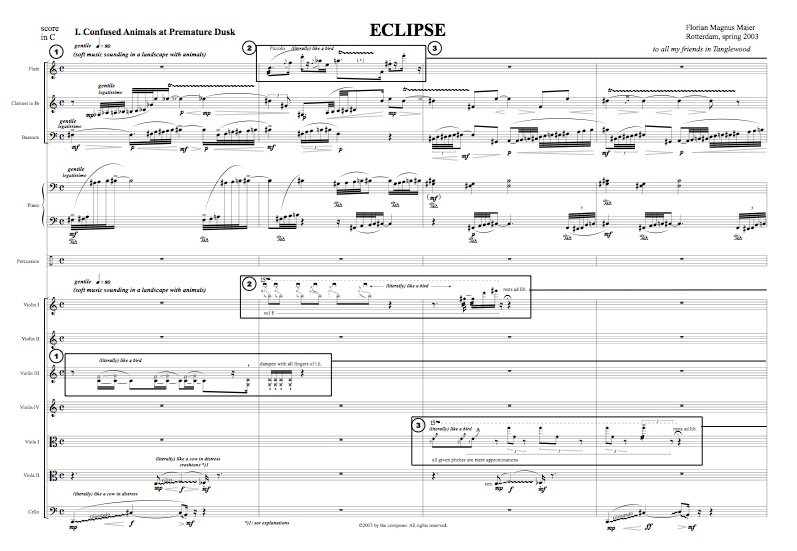Eclipse (2003) 10’30’’
fl cl bn pno perc 4 vlni 2va vc
I. Confused Animals at Premature Dusk - II. Nightrise - III. Eye of God: Eclipse - IV. Fade to Bright / Profanity Regained
written for: TMC Contemporary Music Ensemble as the Paul Jacobs Memorial Commission 2003
first performance: Tanglewood, USA, july 2003
“Colorfully scored for small orchestra and ably led by Gaffigan, it conjures the effect of a solar eclipse on animals and the environment.
From this clever premise, four sections evoked the eerie calm before the noontime night, and confused distress of woodwindy birds and brass-rendered cows in premature dusk. In the funny but political finale, peace returns, disturbed only by a radio, its static and changing stations portrayed by odd use of string instrument bows. (Jacobs, once the Fromm pianist [...] would have admired its originality.)”
(-Berkshire Eagle, july 26 2003)
“A vividly pictorial depiction of a total eclipse of the sun [...] the eerie atmosphere, the disquiet of the animal world, and especially the return to the intrusions of daily life were quite captivatingly done, and James Gaffigan led a lively performance by the fellows of the Tanglewood Music Center.”
(-Boston Globe, july 22, 2003)
This piece is the acoustic depiction of a total eclipse of the sun which I witnessed in 1999 in my home town in Germany. We went to the countryside, where the animals of the fields and forests were the first to sense that there’s something wrong with this particular day. The atmosphere was very peculiar, because the bizarre but peaceful evening mood at noon was disturbed by the distressed cries of all animals around. This is where the piece starts. As the light started to fade, the animals fell completely quiet suddenly and gave way to a short appearance of equally confused crickets, followed by a sudden drop in temperature and an eerie silence hanging over the landscape (second section: Nightrise). The textures and harmonies represent the changing of the light, developping from the gentle “evening music” of the beginning to an out-of-place nightfall which plunges into sudden darkness in the third and central section Eye of God: Eclipse. Here, the chords and their orchestration invoke a sense of overwhelming, transfiguration at seeing the stars shine at noontime and falling into a cosmic abbyss, mounting in a tutti-violin solo expressing this combination of agony and perplexity. As it came, so this galactic disturbance disappears as the sun returns in time-lapse, dispersing the spell and restoring the order of the day. The world starts to breathe again, and the lingering sense of momentary magic is swallowed up by the return of the sounds of daily life, the profanity of which is represented in the intrusion of a radio in the distance that awakens the beholder from his transcendental vision.
listen: Eclipse Clip!

